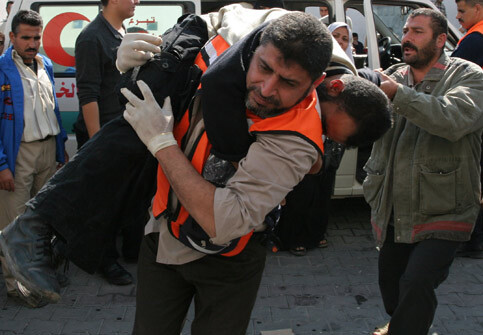Médecins du Monde 16 November 2006

Palestinian paramedics carry a wounded young man into Beit Lahiya hospital after he was injured during an Israeli military incursion into the northern Gaza Strip town of Beit Hanoun, 3 November 2006. (MaanImages/Wesam Saleh)
Since February 2006, the Occupied Palestinian Territories have suffered the effects of the international economic embargo ordered by the main western donors after Hamas’s victory in the parli amentary elections of 25 January 2006. The suspension of aid causes extra problems for the Palestinian civilian population, whose living conditions have continued to deteriorate ever more sharply since 2000. In this context, operation “Summer Rain”, launched by the Israeli army on 28 June as a reaction to the kidnapping of a soldier by Palestinian militants, is an additional aggravating factor which increases the risk of destabilising the area and driving the Palestinian Territories into a major humanitaria n crisis.
70% of the Palestinian population currently live below the poverty line (2), the recorded unemployment rate in the Gaza Strip stands at 40%(3) and it is harder to access food and drinking water than before 2000. In addition, the destruction of infras tructure and main transport routes during operation “Summer Rain” launched on 28 June, greatly hinder electricity, drinking water and fuel distribution and restrict travel in the Gaza Strip. Therefore, beyond the immediate consequences on the population’s physical and mental health, the latest Israeli incursion into the Gaza Strip could have long -term effects and weaken still further an already unstable situation.
Médecins du Monde-France (MdM) is an international solidarity medical association which has been involved since 1980 in improving the living conditions of civil ian populations across the world, especially in terms of access to hygiene, medicines and health care.
In this report MdM is seeking to evaluate the Gaza n population’s health care access and the problems health care teams have faced since the beginning of 2006 through an analysis of the health status of patients consulting medical facilities in the Gaza Strip .
The analysis is based on data collected directly on the ground during two surve ys led by MdM-France and carried out by its local team based in Gaza. These surveys were carried out before and during operation “Summer Rain”, the first from 27 to 29 June 2006 and the second from 3 to 8 July 2006 (4). They covered a total population of 1487 people who came for consultations at fifteen health facilities representative of all the Gazan health facilities and distributed across the Gaza Strip (north, centre and south). There were three parts to the surveys : living conditions (work, housing conditions, access to food and water), health care access (accessibility of health facilities and medicines for patients, accessibility of place of work for health care workers), and mental health .
The most revealing results about the overall situation before operation “Summer Rain”, and then about how the situation deteriorated, concern:
Access to health facilities: at the beginning of June, 23% of patients took over a week to seek a consultation. Since the beginning of July, it took them on average four times longer to reach health facilities.
General health status: in May 2006, premature births in hospitals increased by 60% . 52.6% of patients who consulted were suffering from chronic illnesses; 93% of them were receiving treatment . Psychological illnesses were continually increasing, especially among children . Since June 2006, 84.7% of the interviewees had witnessed a traumatic event in the days preceding the consultation .
Employment: 35% of interviewees said they were unemployed or had no fixed income. 30% of those with a job were working in the informal sector.
To download the full report (PDF) click here.
Related Links